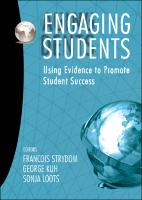Engaging Students
Using Evidence to Promote Student Success
Contributor(s)
Kuh, George (editor)
Strydom, Francois (editor)
Loots, Sonja (editor)
Language
EnglishAbstract
The book provides a rich, informative picture of the current state of student engagement evaluation, while also highlighting challenges and opportunities for future advances. A particular strength of this publication is its emphasis on the importance of taking evidence-based decisions, and showing how the South African Survey of Student Engagement (SASSE) can provide the evidence for well-informed changes in policy and practice in order to enhance student success." - Prof Magda Fourie-Malherbe, Stellenbosch University
Keywords
Academics; Academic achievement; Academic advising; Academic advisors; Academic challenge; Academic development; Academic literacy; Academic performance; Academic support; Access; Academic staff (also see academics/Lecturers); Actionable; Active learning; Agency; Aggregated; Analyse; Apply; Ask questions; Assessment; Attitude; Australasian Survey of Student Engagement (AUSSE); Beginning University Survey of Student Engagement (BUSSE); Benchmarking; Bloom’s taxonomy; Business; economics and management; Campus environment; Capacity; Career advisors; Challenges; Classroom activities; Classroom Survey of Student Engagement (CLASSE); Co-curricular (also see extra-curricular); Cognitive; Cognitive development; Cognitive educational activities; Cognitive functions; Cognitive skills; Collaborative learning; Colleges; Community college; Comprehensive universities; Conditional formatting; Contextual; Contextual challenges; Contextualised; Council on Higher Education (CHE); Course (module/subject); Critical thinking; Culture; Curriculum; Data; Data-informed; Decision-making; Decolonisation; Deep learning; Department chairs (heads of departments); Department of Higher Education and Training (DHET); Development; Developmental outcomes; Diagnostic; Disaggregating; Discussions; Discussion with diverse others; Dropout; Education outcomes; Effective educational behaviours; Effective educational practices; Effective leadership; Effective teaching practices; Empirical; Engagement – also see Student Engagement; Engineering; Equity; Equitable outcomes; Evaluate; Evidence; Evidence-based; Expectations; Expected academic difficulty; Expected academic perseverance; Experiential learning; Experience with staff; Extended degree; Extended curricula; Extra-curricular (also see co-curricular); Financial Stress Scale; First-generation; First-year; Food; Food insecurity; Frequency; Freshman myth; Gender; Graduate attributes (Learning outcomes); Group work; Heads of departments; High-Impact practices; Higher education outcomes; Higher-Order Learning; Holistic; Humanities; Incentive; Indicators; Innovation; Innovative; Instructional paradigm; Interactions; Interventions; Institutional culture; Institutional performance; Institutional research; Institutional researchers; Institution-wide approaches; Interpersonal relationships; Interpersonal skills; Intersectional; Intersectionality; Irish Survey of Student Engagement (ISSE); Knowledge; Knowledge society; Language; Law; Leaders; Leadership (management/university leadership); Learning; Learning environments; Learning facilitator; Learning outcomes; Learning paradigm; Learning strategies; Learning with peers; Lecturer Survey of Student Engagement (LSSE); Lecturers (also see academics/academic staff); Librarians; Management (University leaders and Leadership); Mathematics; Memorisation; Mentor; Mentoring; Mentorship; Mission; Module (course/subject); Motivation; National Benchmark Tests (NBT); National Benchmark Test Project (NBTP); National Development Plan; National Survey of Student Engagement (NSSE); Natural and Agricultural Sciences; Next Generation of Academics Programme (nGAP); Numeracy development; Off-campus; On-campus; Online resources; Pathways; Peer learning (also see Tutor); Pedagogical approaches; Pedagogical contexts; Pedagogical environments; Pedagogical experiences; Pedagogical innovation; Pedagogical practices; Pedagogical relationship; Pedagogical responsiveness; Pedagogies; Perceived academic preparation; Perceived preparedness; Persistence; Policies; Policy; Policy makers; Practical significance; Practical work; Preparing for class; Professional development; Professionals; Professional staff; Quadrant; Quality; Quality assurance; Quality of interactions; Quantitative reasoning; Reflection; Reflective and integrative learning; Relationships; Research; Responsiveness; Resources; Retention; Science; engineering and technology; Self-reflection; Senior students; Service learning; Social sciences; Socio-economic; South African Survey(s) of Student Engagement (SASSE); Staff development (also academic development and lecturer development); Stakeholder; Strategies; Statistical; Student affairs; Student behaviour; Student bodies; Student data; Student development; Student engagement; Student evaluation; Student financial aid; Student involvement; Student learning; Student life; Student needs; Student outcomes; Student organisations; Student perspective; Student participation; Student performance; Student persistence; Student retention; Student responses; Student societies; Student-staff interaction; Student success; Student views; Student voice; Success rates; Subject (course/module); Support services; Support staff; Supportive campus; Supportive environment; Synthesise; Systemic perspective; Systemic understanding; Teaching; Teaching and learning; Techniques; Time; Time management; Traditional universities; Transformation; Transformative; Transition; Tutor; Tutorials; Undergraduate research; Underprepared; United States; University Capacity Development Grant (University Capacity Development Programme); Universities; Universities of Technology; University leaders; Unrealistic; Well-beingDOI
10.18820/9781928424093ISBN
9781928424086, 9781928424093Publisher
UJ PressPublisher website
https://ujonlinepress.uj.ac.za/index.php/ujpPublication date and place
Bloemfontein, 2017Imprint
UJ PressClassification
Higher education, tertiary education


 Download
Download